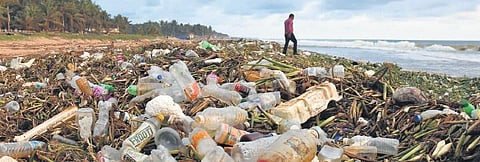

Marking International Zero Waste Day last Thursday, the Suchitwa Mission joined forces with IT company UST for a clean-up drive on Perumathura Beach in Thiruvananthapuram. About 180 volunteers, including 100 techies, took part in the initiative, which got a thumbs-up from nature lovers.
Similar drives have been held along the coast of Kochi as well. Incidentally, a German tourist recently went viral with his solitary clean-up mission on Fort Kochi’s Mahatma Gandhi Beach. While such initiatives should certainly be encouraged, a critical question should haunt us: Is enough being done?
No, say, experts, highlighting that the government’s sincerity to the cause and efforts have remained wanting.
Despite policies and major announcements, marine littering and plastic pollution continue to plague Kerala’s 590km coastline. Besides greenwashing initiatives such as beach clean-up drives, the authorities have failed to come up with sustainable solutions to the growing menace.
As per estimates, Kerala generates about 450 tonnes of plastic every day, and around 70 per cent of this junk ends up in the sea. Though a decision was taken to implement the Suchitwa Sagaram project — launched in 2017 in Kollam — across the state, the government hasn’t sanctioned adequate funds for its execution.
The Kollam model
Notably, since the launch of the project, the fishermen venturing into the sea have brought back tonnes of plastic waste to the harbour at Neendakara in Kollam as part of Suchitwa Sagaram. The waste is segregated, shredded and used for road construction.
Official sources say the fisheries department had requested Rs 5 crore for implementing the project at key harbours in the state. However, the government has sanctioned only Rs 50 lakh. Currently, the Suchitwa Sagaram at Neendakara, too, is facing a fund crunch.
“We need to pay salaries for the workers. We have requested more funds,” says a senior fisheries official.
In Kollam, 23 women workers have been deployed for handling plastic waste at Neendakara harbour. “We need Rs 40,000 for paying salaries for the workers. In addition to this, there are other expenses, including procurements of safety gear and other equipment needed for cleaning the plastic waste brought by the fishermen,” says an official of the Harbour Engineering Department (HED).
According to the government’s policy, the project is to be implemented in 21 harbours across the state. “We have constituted Harbour Management Societies at every harbour for implementing the project,” says another HED official.
“Neendakara is the largest harbour in Kerala. Some of the harbours are not big enough for setting up facilities for plastic waste management. So it’s not possible to implement it everywhere. We plan to implement the project in a phased manner, and will come up with a rough plan soon.”
The official adds that the Suchitwa Sagaram project is not profitable: “We are doing this for environmental protection. The plastic waste collected (about 500kg a month) is handed over to Clean Kerala Company Ltd, and they pay a minimal amount per kilo of waste. This is not enough to sustain the project. If scaled up, we will be able to give livelihood to a lot of women.”
World Bank-funded project in limbo
About three years ago, the government had announced the `280-crore Integrated Coastal Zone Management Project. Funded by the World Bank, the project’s primary aim was to clear marine litter and ghost nets from Kerala’s coasts.
In the first phase, the plan was to implement the pilot project along the 175km coastal stretch covering Kasargod, Kannur, Malappuram and Kozhikode, with the Kerala State Coastal Area Development Corporation as the nodal agency.
However, besides initial studies and preparation of a detailed project report (DPR), nothing much has happened on the ground. “The pandemic struck and the project failed to progress,” says a top official associated with the project. “The Centre is yet to take steps to claim the fund from the World Bank. Both the Centre and state have to chip in funds, and now nobody is taking initiative to implement the project.”
What is the urgency?
According to a recent UN study, if the present situation continues, the deposit of plastic waste in oceans will double by 2030. By 2040, it will be triple, with 23 to 37 million metric tonnes of plastic waste getting added every year. Executive director of the NGO Thanal, C Jayakumar, says the usage of single-use plastic, which forms a major chunk of marine litter, has gone up.
“Before Covid, we had implemented a green protocol. But after the pandemic crisis period, packaging became liberal and usage went up, increasing the generation of plastic waste in households,” he notes.
“Rules and regulations alone will not help. If a community does waste management well, they should be rewarded in some way to encourage them.”
Jayakumar says the state government should take steps to implement the extended producer responsibility concept. “The companies generating the waste will pay the local bodies for handling their waste. This is being successfully implemented in developed countries,” he adds. “In Germany, they collect a deposit from the consumer when they buy a bottle of water and return the money when they return it after use.”
Dirty coast
590km coastline of Kerala needs an urgent cleansing
450 tonnes of plastic waste is generated daily in the Kerala
Suchitwa Sagaram project:
Rs 5 crore has been sought to implement he project at key harbours
Only Rs 50 lakh has been sanctioned to date